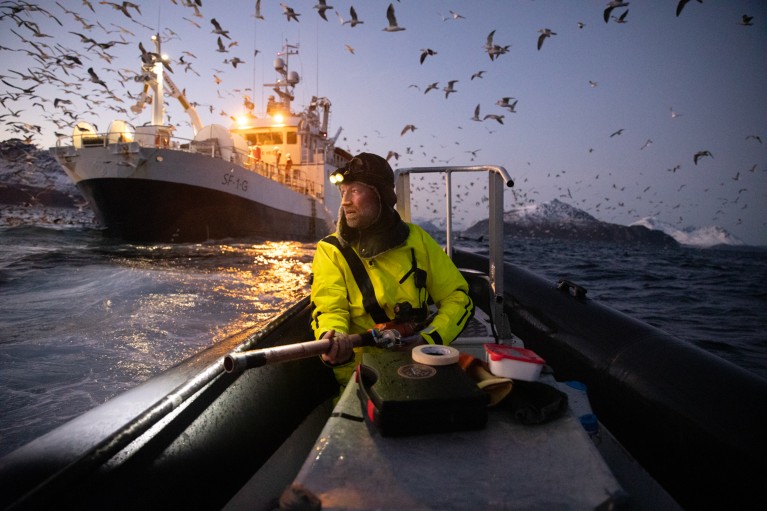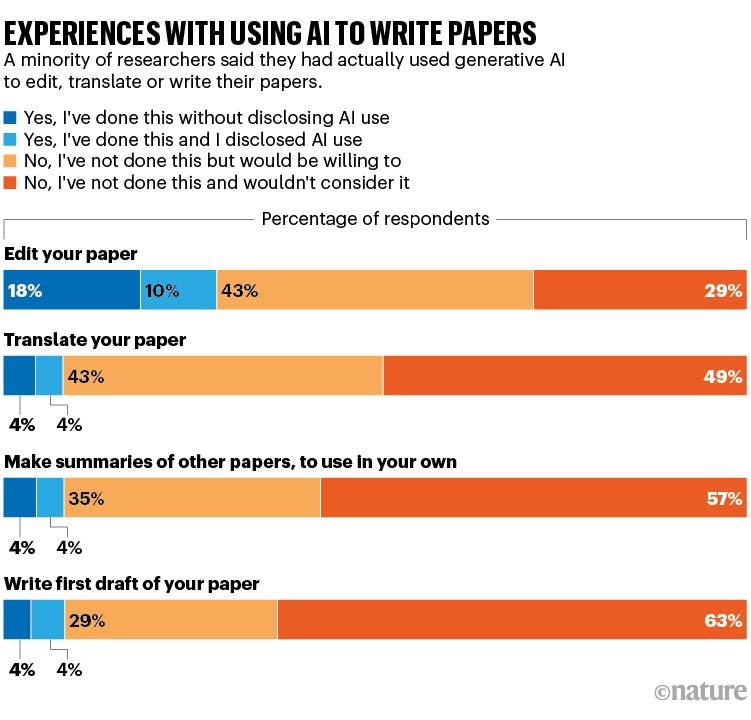You have full access to this article via your institution.
Hello Nature readers, would you like to get this Briefing in your inbox free every day? Sign up here.

Spatial ecologist Emma Vogel photographed biologist Audun Rikardsen as they tracked whales in a northern Norwegian fjord.Credit: Emma Vogel
The winners of Nature’s 2025 #ScientistAtWork photo competition feature researchers battling waves, hoisting weather balloons and braving the freezing night. The overall winner, above, was taken by animal-movement researcher and spatial ecologist Emma Vogel. “It feels quite calm,” she says of the photo. “I’m used to so much going on during fieldwork. It seems very thoughtful, and breathing, and just taking a moment.” Their fieldwork involves tagging whales with satellite tags, which are deployed using the wide-barrelled air gun seen in the photo. “You could smell their breath,” says Vogel. “And you could hear them before you can see them, which is always quite incredible.”
Scientists have identified three ‘anti-spice’ compounds in chilli peppers that partially negate the heat of capsaicinoids — the molecules that give chillies their kick. The findings could explain why some chillies aren’t as fiery as their rating on the Scoville scale — the measure of a pepper’s spiciness based on the concentration of capsaicinoids it contains — would suggest. Farmers could use this knowledge to create hotter or milder chillies, says food scientist Devin Peterson.
Reference: Journal of Agricultural and Food Chemistry paper
Pound for pound, weight-loss drugs seem to reduce the risk of obesity-related cancer even more than bariatric surgery, suggesting that GLP-1 agonists have anti-cancer effects beyond simple weight reduction. “We already know bariatric surgery cuts obesity-related cancer risk by about a third; these data suggest target GLP-1s may cut that risk by nearly 50% — an approach that would be transformational in preventing obesity-related cancer,” says cancer researcher Mark Lawler.
Reference: eClinicalMedicine paper
Features & opinion
A Nature survey reveals that researchers are sharply divided on which uses of AI they consider ethically acceptable. Academics generally feel it’s acceptable to use AI chatbots to help to prepare manuscripts, but few report actually using AI for this purpose — and those who did often don’t disclose it. As for peer review, most frowned on using AI to generate an initial report, but the majority felt it was acceptable to use AI to assist in peer review by answering questions about a manuscript. Before looking at the results, you might want to answer some of the survey questions yourself.

“I’m used to spending up to 12 hours a day in the lab… at the detention center, there is no access to computers,” writes Russian biomedical researcher Kseniia Petrova, who works at a Harvard Medical School lab in the United States. “Fortunately, my beautiful colleagues have mailed me academic articles and books.” In an arresting first-hand account, illustrated with stunning micrographs from her research, Petrova describes being detained by border agents three months ago, on the way back from holiday in France. “I am hesitant to comment broadly on what it’s like for scientists now in America because I have only limited information about what is going on outside of this detention center,” she writes. “What I do know is that my colleagues, many of whom are, like me, foreign scientists, are terrified.”
The New York Times | 6 min read
“Badly digested” versions of the philosophies of Karl Popper and Thomas Kuhn have misled some physicists to believe that the field can be advanced only by overturning what already exists, argues theoretical physicist Carlo Rovelli. But blockbuster experimental results, such as the discovery of the Higgs boson and the detection of gravitational waves, have largely confirmed existing theories. “It has at times been fashionable to say in theoretical physics that there is a lack of sufficiently wild, completely new ideas,” writes Rovelli. “But perhaps the problem is physicists running too much after wild new ideas.”
As someone with a poor sense of direction (I blame my hometown’s grid-like street layout), I’m delighted to hear that when I finally take a holiday on the Moon, I might have a trusty satellite navigation system to guide my moonbuggy. A prototype lunar sat-nav would use signals from moon-orbiting satellites, rather than current methods that rely on data relayed from Earth.
Let me know what technology you can’t live without — or what you’d most need on your Moon break — at [email protected].
Thanks for reading,
Flora Graham, senior editor, Nature Briefing
With contributions by Jacob Smith and Felicity Nelson
Want more? Sign up to our other free Nature Briefing newsletters:
• Nature Briefing: Careers — insights, advice and award-winning journalism to help you optimize your working life
• Nature Briefing: Microbiology — the most abundant living entities on our planet — microorganisms — and the role they play in health, the environment and food systems
• Nature Briefing: Anthropocene — climate change, biodiversity, sustainability and geoengineering
• Nature Briefing: AI & Robotics — 100% written by humans, of course
• Nature Briefing: Cancer — a weekly newsletter written with cancer researchers in mind
• Nature Briefing: Translational Research — covers biotechnology, drug discovery and pharma


